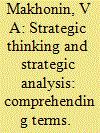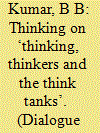| Srl | Item |
| 1 |
ID:
088789


|
|
|
| 2 |
ID:
161907


|
|
|
|
|
| Summary/Abstract |
This paper looks at two concepts fairly popular in military political analysis, to wit: strategic thinking and strategic analysis, from the viewpoint of logic. When exploring strategic thinking, attention is focused not only on the interpretation of the notions thinking and strategy, but also on the content of thinking, which is to follow the rules of logic. Strategic analysis is examined strictly as a method.
|
|
|
|
|
|
|
|
|
|
|
|
|
|
|
|
| 3 |
ID:
141386


|
|
|
|
|
| Summary/Abstract |
The institution of a “think tank” is something new for India. We had thinkers, but not the think tanks. Our society always placed highest trust on its thinkers and their written words. This was, because ‘thinking’ in this country was a most rigorous process. It lacked self-centrism; for an Indian thinker, there was no conflict between the interest of the society (paramarth) and self-interst (swartha) of the thinker. The thought used to emerge from deep study (adhyayan), deep and intense thinking (manana) and contemplation (nididhyasan). Thinking was not only a rigorous, but also an open process. As the Rig-Veda said: ‘Let the noble thoughts come to us from every side’ (A no bhadrah kratavo yantu vishvatah; Rig 1.89.1), the noble thought from anybody and anywhere was welcomed in this country. The people’s trust in its thinkers was, any way, not a misplaced one; they did not feel deceived. The situation, however, drastically changed, when India was colonized. The colonizers came with a “true” ideology, which declared this country’s religion and culture “untrue.” They came with the “light” to remove our “darkness” and assumed the self-assumed “Whiteman’s Burden” to educate and civilise us. Colonial masters were expert myth-makers, which our English-educated intellectuals are still parroting. The myths and lies strengthened the colonial forces; they became excellent tools of social divide.
|
|
|
|
|
|
|
|
|
|
|
|
|
|
|
|